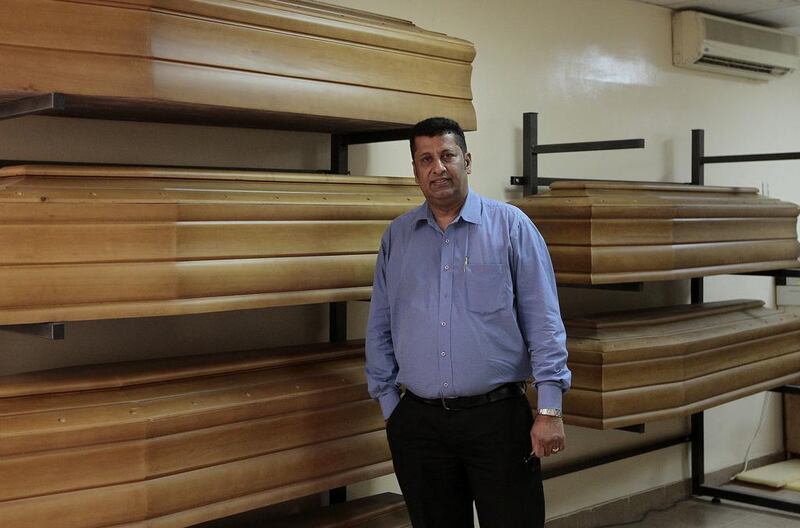ABU DHABI // Pakistan is the only country that takes home for free citizens who have died in the UAE, repatriation companies say.
For other expatriates it can cost between Dh8,000 and Dh30,000.
The cost depends on the price of an air ticket and the weight of the body, said John Korah, managing director of Grafco, which repatriates about 15 bodies a month.
“The cost depends on the country. The airline cargo rates are the major factor for the cost,” Mr Korah said.
He said that if the deceased had life insurance the cost was covered, and sometimes their employer was kind enough to bear the cost.
If not, family members have to foot the bill.
_____________________________
Read more on our ‘Burial in the UAE’ series:
■ Many expatriates opt for burial in UAE
■ Abu Dhabi expat fulfils friend's wishes of being buried in Philippines
_____________________________
Mr Korah said repatriation companies provided a complete package to the family of those who had died, including completing all of the paperwork with the police, embassy, airline and airport.
Vivian Albertyn, owner of another repatriation company, Middle East Assistance, said religious sensitivities were always a major priority.
“We accommodate all religions. However, paperwork and logistics are the same for everyone,” Mr Albertyn said.
He said it normally took between two and three working days to complete all formalities, or one to two weeks if police were involved.
Mr Korah said police clearance was the major challenge in repatriation.
“The legal clearance takes most of the time while clearing the body for repatriation, especially when there is a police case,” he said.
There had been many cases where the family could not afford the cost of repatriation, Mr Korah said. “In such a situation we provide a helping hand. We try to help them through the support of embassy and charity groups.”
He urged expatriates to make sure costs were covered but said many foreign workers had not planned for repatriation.
Nasir Iqbal, 60, a Bangladeshi driver in Abu Dhabi, had no idea what would happen to his body if he died in the UAE, far away from his family.
“I live alone here. I have no relatives. I don’t know what would happen to my remains,” Mr Iqbal said. “I hope my company and my co-workers would send all my savings to my wife and kids.”
Dr Rafeeya Pasha, a social worker who has dealt with many repatriation cases, said there was urgent need to educate people on the need for planning.
“Ideally one should have a will and insurance that can deal with such unforeseen tragedies, especially when you are all alone,” Dr Pasha said.
“However, not all the expatriates in the country can afford this. Legal will drafting can be an expensive thing.
“Similarly, not all companies provide good medical or life insurance to their employees.”
Dr Pasha said she had dealt with many cases where families did not know how to cope.
“Many expatriates have no idea how the system works in the UAE and above all, many greedy faces appear in the scene who are only interested in how to grab the money left by the deceased and have no sympathy for his family,” she said.
Dr Pasha, a Pakistani, hoped other countries would follow the example of her embassy and Pakistan International Airlines in not charging for repatriation.
“This should be the responsibility of every mission whose citizens are working and living here, and also paying their taxes back home,” she said.
akhaishgi@thenational.ae






